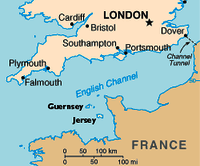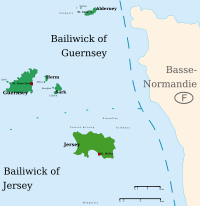Channel Islands
The Channel Islands (French: Îles Anglo-Normandes, Norman dialects: Îles d'la Manche) are located just off the coast of France mainly in the Bay of St Malo. They are Crown Dependencies of the United Kingdom, which means that they are self-governing in all respects except for defence and foreign affairs, which are the responsibility of the UK government.
- For other places with the same name, see Channel Islands (disambiguation).


Islands
The islands fall into two separate Bailiwicks (historic feudal divisions), each of which has its own separate government. Guernsey, Alderney and Sark (comprising the Bailiwick of Guernsey) is effectively a Customs Union with no customs controls between them, despite the fact that Sark levies taxes on alcohol and tobacco at a much lower rate than the rest of the Bailiwick!
| Bailiwick of Guernsey Smaller than Jersey, and pretty, with a smaller town but less open countryside than Jersey. It includes the islands of Alderney, Sark, Herm, and many smaller offshore islands. |
| Bailiwick of Jersey The largest and most developed of the islands, with the most to do. |
Cities
The larger islands are divided into parishes (Alderney is one parish, the Parish of St Anne).
Other destinations
Understand
History
The Channel Islands have been inhabited for over 5,000 years and have a long and colourful history. During World War II they were occupied by Nazi Germany. They have many military structures, from this period and from the time of the Napoleonic Wars.
They count their independence of any ties to France from the year 1204.
Today, the islands' Head of State is the Queen of United Kingdom, who is represented in the islands by her Lieutenant-Governors. The Queen's role derives from her status as the successor to the now-defunct Duchy of Normandy, and the Islanders' version of the Loyal Toast is to "The Queen, our Duke". The islands' laws are a mixture of local legislation, customary law (heavily influenced by the English Common Law), Acts of the UK Parliament which have been extended to the islands and some European Union law. The islands have their own tax systems, currencies which are tied to pound sterling, banknotes, and individual parliaments. The relationship with the EU is little understood. They are in the European Customs Union allowing the free movement of people and of goods, but outside the ambit of fiscal and social legislation.
Talk
English is spoken throughout the islands. Curiously, the local accents have a New World flavour to them, for instance Guernsey people have the habit of putting an upwardly-inflected "eh!" on the end of sentences (like a stereotypical Canadian accent), while Jersey accents have been likened to those from South Africa.
There are still speakers of Norman dialects Jerriais and Guernesiais. These are closely related to, and mutually-intelligible with, French. French is also the co-official language in Jersey, alongside English, but not many people speak it.
Get in

Like the UK, the Channel Islands are outside the Schengen Agreement but form a Common Travel Area with the UK, Republic of Ireland and Isle of Man.
By air
The Channel Islands have their own airline, Aurigny which offer flights to the islands' airports from London and elsewhere.
- Guernsey Airport (GCI IATA) - to/from the UK (London Gatwick, London Stansted, Bristol, Birmingham, Bournemouth, Exeter, Manchester Airport and Southampton), France (Dinard and St Brieuc), Jersey, Alderney, Germany (Dusseldorf and Stuttgart) and Rotterdam in the Netherlands.
- Jersey Airport (JER IATA)
By boat
- St Peter Port, Guernsey - to/from the UK (Poole, Portsmouth and Weymouth), Saint-Malo in France and other Channel Islands.
Get around
By train
In Alderney, there is the Alderney railway, a heritage railway line and the only remaining railway line in the Channel Islands.
There are no trains in Guernsey, Jersey or Sark.
See

Do
Eat
Food is generally the same as in the United Kingdom.
Drink
Due to their autonomous status, taxes on alcohol are lower than in the United Kingdom, and so prices can be lower.
Stay safe
A lot of the people here are friendly and will be happy to assist you around the islands.
Go next
It is possible to take day trips to ports in France, such as St Malo.